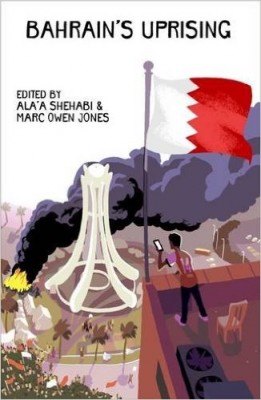“Bahrain’s Uprising...Resistance and Repression in the Gulf”: Book Dedicated to the Feb. 14 Events Featuring 9 Writers

2015-09-23 - 12:45 am
Bahrain Mirror (Exclusive): On September 15, 2015, "Bahrain's Uprising...Resistance and Repression in the Gulf" was published. It is a book edited by the founding member of the advocacy group Bahrain Watch Dr. Ala'a Shehabi and her coworker in the organization PhD candidate Marc Owen Jones, who has written extensively about Bahrain for CNN, Democracy Now!, and Index on Censorship, and is also a regular contributor to the Economist Intelligence Unit.
A soft-copy version of the book is now available for download on amazon.com whereas the hard-copy version will be available by mid next month and can be ordered online on the same website.
According to the editors, this publication is first English-written book dedicated to the events of 2011 that took place in Bahrain, examining the ongoing protests and state repression that continues today.
Fusing historical and contemporary analysis is what the editors described the book as, which comprises of chapters written by the Bahraini professor Abdulhadi Khalaf, activist Ala'a Shehabi, Australian academic who was expelled from Bahrain Tony Mitchell, former Secretary-General of Wa'ad society Ebrahim Sharif, PhD candidate and researcher Marc Owen Jones, Australian journalist and PhD researcher Zoe Holman, Bahraini writer and poet Ali Al Jallawi, Amal Khalaf and Bahrain Watch Members John Horne and Luke Bhatia.
This broad collection of writings by activists and scholars provides a rarely heard voice of the lived experience of Bahrainis, describing the way in which a sophisticated society defined by a historical struggle, continues to hamper the efforts of the ruling elite to rebrand itself as a liberal monarchy, the editors added.
Marc Owen Jones to Bahrain Mirror: The book will irritate the government
"The idea was to have a mix of ideas from activists, opposition members and academics, as well as members of the public who would not identify as any of those. We acknowledge that no book can be adequate in achieving that of course but this was meant to be the first volume of a series that would seek to do that," said Marc Owen Jones in a statement to "Bahrain Mirror".
Jones stressed that "the book itself is interdisciplinary and flits between eyewitness accounts, analysis, historical context, and description."
"We hope the book will offer some narrative and explanation of a very fluid situation, and serve as a testament that in some ways describes and explains the context and nature of the uprising, and its historical setting. We think a powerful set of narratives, devoid of PR, will be a means for people familiar and unfamiliar with Bahrain to learn about the struggles and injustices faced by many," he added.
Answering Bahrain Mirror's question about his prediction concerning the Bahraini regime's reaction to the book, Jones said: "The government of Bahrain will probably dislike the book, although it will not be teaching them anything new about themselves. I do think the powerful analysis, backed up by strong historical evidence, will irritate the government in that it adds a stronger foundation to oppositional grievances, one that is often lost amidst the news deluge."
The book was Published by the UK's Zed Books, and will be distributed in the US by University of Chicago Press. On the cover, there is a depiction of the Pearl (Luoluo) Roundabout and the raid launched on it, as it was the cradle of the historic protests in February-March 2011.
The book's description on Amazon says: "Painting a picture of a nation defined by oil wealth and deep inequality, Bahrain Uprising offers a voice for the ordinary citizen, telling the story of the uprising and taking readers into the dynamic culture of street protests that continue to put pressure on the slowly changing monarchy."
The editors stated that this book is driven by three main motivations: "First, to harness the emancipatory power of storytelling, not just to ‘give a voice' to the oppressed (they already have a voice), but to enable others to hear these voices, voices that have been ignored and effectively erased through imprisonment or banishment. Second, to chart the configurations and reconfigurations of dissent and the changing spaces of representations, be they physical, digital, or organisational. Third, to look at changing modes of repression, the institutional processes of violence, and the transnational nature of the uprising."
Reviews
"Brings together a powerful group of voices, observers and activists, who have worked not only to make sense of events in Bahrain, but who have also tirelessly advocated for justice in one of the region's most tyrannical states. A timely and important volume."-Toby Jones, Rutgers University
"An outstanding volume that fills a chasm in the scholarship on the Arab revolutions and uprisings. Beautifully written, empirically rich, theoretically provocative and meticulously researched, it is a must-read for scholars interested in social movements in Bahrain and more broadly. The book includes compelling activist testimonies and pointed editorial cartoons, also making it an ideal text for classroom teaching."-Frances S. Hasso, Duke University "An essential addition to scholarship on the revolts and counter-revolutionary backlashes that have roiled the Arab world since 2011. Through first-person accounts and rigorous analysis, this book teaches us a great deal not only about contentious politics and social movements in Bahrain but about regional geopolitics writ large." -Lisa Hajjar, University of California, Santa Barbara.
- 2017-08-10Bahrain Mirror Publishes “Stateless” by “Ali Al-Dairy”
- 2016-12-14“Ali Al Dairy” Tackles Establishing First Saudi State in New Book “Texts of Monstrosity: Takfir and Wahhabi Politics”
- 2016-12-14Bahraini Center Publishes “Mr. Ambassador: Mohammad Javad Zarif" in Arabic
- 2016-12-12An Excerpt of “Jaw” Novel: Jordanian Officer Involved in Detainees’ Torture Speaks Up
- 2016-04-27Book on Sheikh Al-Nimr’s Plea Launched in Beirut